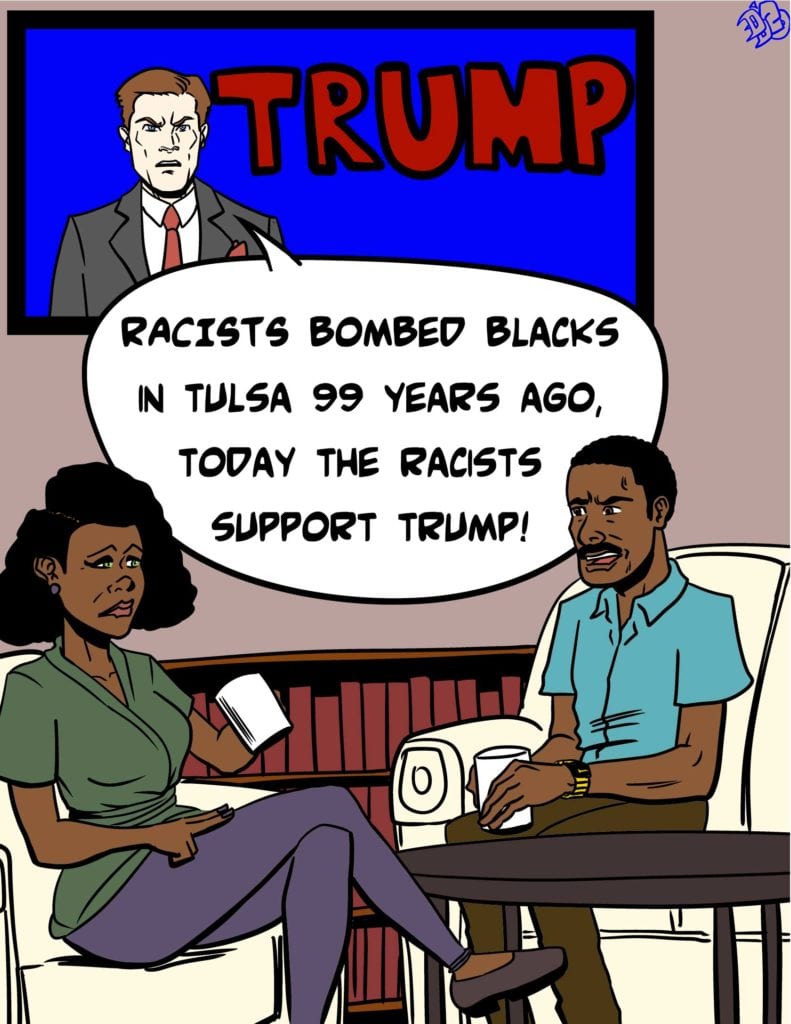
America has experienced a profoundly ignominious moment. On May 31, 1921, whites in Tulsa, Oklahoma utterly destroyed the black section of the city that was known as Greenwood. This was one of the most well-developed and law abiding communities in Tulsa. According to some historians, that was the problem. Greenwood’s success created a fatal case of white envy.
The conflict began in a common way in racist America. A white woman accused a black boy of sexual assault. After he was arrested, a white mob developed to execute the accused before the courts could complicate the matter with a time-consuming trial. But armed black men showed up to escort the prisoner to security within the justice system. A shootout began, and it developed that the sheriff’s department was allied with the lynching party.
The battle soon spread to the residential area of Greenwood as residents joined the fight to protect their families. The National Guard entered the fray with machine guns, and airplanes flew over and dropped fire bombs to burn Greenwood to the ground. The final damage of the encounter was an estimated 50-300 residents killed and homes, stores, business buildings and churches destroyed by fire, and about 10,000 blacks left homeless.
All of this violence and destruction occurred only because blacks wanted the charges against the black youth to be decided in a court of law rather than by a mob, and whites in Tulsa were humiliated to see blacks build a more prosperous community than theirs.
Clear-minded whites knew at once that the conduct of whites in Tulsa was unjustifiable. Awareness of what happened in Tulsa on one day in 1921 seemed to discreetly disappear. In a recent “60 Minutes” interview with middle-aged black Tulsa residents, it seemed that there was no mention of the event in the public schools and people had little knowledge of the massacre of blacks in their own town.
The awareness of the attack on blacks by whites in Tulsa was much greater among the older generation. A conversation in 1953 with blacks who claimed to have been involved in the battle only 32 years earlier was much more lively. They had accounts of various aspects of the massacre.
With such limited knowledge of the Tulsa violence, few are likely to know much about the backstory. Oklahoma did not become a state until 1907. Only 14 years before Greenwood, Oklahoma was known as the Indian Territory. Whites seized land settled and owned in several Southern states by various Native American tribes and gave them in exchange some land in what became Oklahoma. The rights of Native Americans prevailed against the compulsory land swaps, but President Andrew Jackson refused to enforce the court decisions.
The Choctaw, Creek and Cherokee tribes were forced out of Georgia, Alabama, North Carolina, Florida and Tennessee on what became known as the “Trail of Tears” in 1835 and 1836. The trek was more than 5,000 miles from their lands in the South and thousands died along the way. Native Americans did not get U.S. citizenship rights until 1924, and their voting rights were not assured everywhere until 1962.
After 1865, during the Reconstruction period, blacks in the Old Confederacy left to start a new life in the Indian Territory where there was no history of the enslavement of blacks by whites. But after the establishment of the state of Oklahoma in 1907, whites did not intend for blacks and Native Americans to have a major role in government.
The brutal treatment of the Native Americans established that whites could not be expected to be more cordial to blacks. Perhaps inhumanity to outsiders is a consistent element of their culture. Certainly, blacks should learn from this the importance of maintaining a solid historical record of their progress, as well as the anticipated difficulties.






